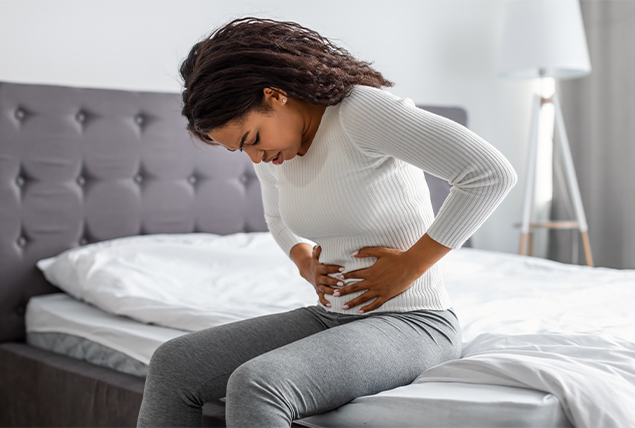Why Do PMS Symptoms Sometimes Worsen With Age?

Premenstrual syndrome (PMS) is common among women of reproductive age. PMS includes emotional, psychological and physical symptoms, and starts about five days before menstruation begins. PMS ranges in severity depending on the person.
For some people, PMS can worsen with age, specifically around perimenopause.
What is PMS and how does it affect your mind and body?
PMS is common in women and girls. Estimates say as many as 3 in 4 menstruating women experience premenstrual syndrome.
The side effects of fluctuating hormone levels typically occur five days before your period starts, according to Cleveland Clinic. Estrogen, progesterone and serotonin vary and may affect mental health.
Estrogen levels bump up during the beginning half of the menstrual cycle. But those levels fall off at the halfway mark. Serotonin levels, however, remain balanced. For those women with PMS, serotonin levels drop as estrogen dips, while progesterone may cause more severe symptoms, according to Fairview Health Services.
Physical symptoms associated with PMS include the following:
- Headache
- Acne
- Fatigue
- Bloating
- Hot flashes
- Night sweats
- Constipation
- Diarrhea
- Weight gain (typically due to water retention)
Emotional premenstrual symptoms may include the following:
- Anxiety
- Depressive moods
- Irritability
- Insomnia
- Difficulty concentrating
- Mood swings
PMS is sometimes so severe that it impacts one's quality of life. Around 20 percent to 40 percent of girls and women experience severe PMS that affects their daily lives, according to a 2017 report. Usually, symptoms dissipate within four days of a menstrual period.
Lifestyle factors such as smoking, diet and sleep quality may play a role in how people potentially experience the intensity of symptoms.
PMS symptoms don't magically disappear as someone ages or after they give birth. Though it’s dependent on the person, PMS can get worse with age.
Why do some women have worse PMS symptoms as they age?
Hormonal changes play a significant role in the occurrence of PMS symptoms, and how they present in general.
"As we age, our bodies begin to produce fewer hormones, including estrogen, progesterone and testosterone, which are important for regulating menstrual cycles. Hormone fluctuations due to decreasing hormone production in premenopausal years can lead to changes in the intensity and duration of PMS symptoms,” said Himali Maniar, M.B.B.S., an OB-GYN at Nisha Women's Hospital and IVF Centre and associated with ClinicSpots in South Bopal, Ahmedabad, India.
Throughout an average menstrual cycle, it’s normal for the hormones estrogen and progesterone to fluctuate. Estrogen increases and decreases twice during a menstrual cycle, causing ovulation and helping thicken the endometrium to prepare for pregnancy. After ovulation, progesterone levels rise and then fall.
But at one transitional period, estrogen levels drop significantly. This occurs right before menopause, a phase called perimenopause. Many women report worsening PMS symptoms during perimenopause.
"When these levels become imbalanced during perimenopause or menopause, a variety of physical, mental and emotional symptoms can occur," Maniar said.
During perimenopause, the ovaries produce less estrogen and ovulation becomes less regular. A shift in ovulation can alter the regularity of a period. Perimenopause can last for a few years before menopause, which is defined by the absence of a period for one year. The first symptom of perimenopause is usually an irregular period and heavier or lighter periods.
Perimenopause can begin as early as a woman's mid-30s through her mid-50s. Experiencing slight or predictable PMS symptoms for decades and then facing an increase of symptoms can be disorienting.
Some symptoms of PMS may amplify during perimenopause. The list of potential symptoms includes the following, according to Maniar:
- Mood swings
- Depression or anxiety
- Irritability
- Fatigue
- Bloating or water retention
- Headaches or migraines
- Breast tenderness or pain
- Food cravings and changes in appetite
- Aches or pains in joints and muscles
Lifestyle changes can also account for more severe symptoms.
"Lifestyle changes that can worsen PMS symptoms include a poor diet, lack of exercise, smoking, and excessive alcohol or caffeine consumption," said Martha Tara Lee, D.H.S., an AASECT-certified sex educator and clinical sexologist with Eros Coaching in Singapore.
Aside from perimenopause, other experiences can also account for why PMS symptoms may worsen with time. Some people may experience more intense symptoms after giving birth. C-section scarring can also influence the severity of period pain.
What can you do for worsening PMS symptoms?
Even if PMS symptoms get worse during perimenopause, recommendations for treating them are the same as during any other time. These suggestions include lifestyle changes, using hormonal birth control and taking over-the-counter medicine for pain.
However, there is a difference between symptoms that become progressively worse each cycle and symptoms that seem to have worsened suddenly. These issues could be due to a lifestyle change, such as not getting enough sleep or eating a poor diet. It can be helpful to track your PMS symptoms each menstrual cycle, take note of new issues and mark worsening symptoms.
"Lifestyle changes that can help alleviate PMS symptoms include regular exercise, a healthy diet rich in fruits and vegetables, stress reduction techniques such as meditation or yoga, and getting enough sleep," Lee said.
To alleviate PMS symptoms, Lee recommends the following:
- Over-the-counter pain relievers such as ibuprofen or naproxen
- Heating pads or hot baths for cramps
- Supplements, such as magnesium or vitamin B6
Those methods could help reduce the physical side effects of PMS.
Anyone experiencing worsening PMS symptoms during perimenopause can expect symptoms to improve during menopause. However, during perimenopause, periods may be irregular, so it can be more difficult to predict symptoms and know how to manage them.
"Someone should see a doctor for changing or worsening PMS symptoms if their symptoms are interfering with their daily life or if they are experiencing new or unusual symptoms," Lee said. "It's also important to rule out any underlying medical conditions that may be causing the symptoms."
Everyone is different.
"It's important to note that PMS symptoms can vary widely from person to person and may be influenced by a variety of factors,” Lee said.
There is no one solution to reduce PMS symptoms. Birth control pills and pain relievers can help, but each woman will need to speak with her doctor to determine the best solution for her symptoms.
When should you seek further help?
While it’s normal for PMS to change with age, certain symptoms may warrant an appointment with your provider.
If menstrual bleeding becomes heavier or unmanageable, it could be a sign of another condition, such as uterine fibroids or adenomyosis, where endometrial tissue grows into the muscular wall of the uterus.
Heavy bleeding is usually defined as passing clots the size of a quarter or larger, or needing to change your period product after less than two hours.
If the weeks before your period are so unbearable they are ruining relationships and causing extreme emotional distress, speak to your doctor. Some women may have more severe PMS symptoms and experience premenstrual dysphoric disorder (PMDD), which causes extreme mood shifts that can disrupt daily life and bring turmoil to an individual and their relationships. Medical treatment is available.
"If lifestyle changes are not helping to reduce the severity of PMS symptoms and you are having difficulty managing them, it is important to consult your doctor," Maniar said.
There are ways to help manage symptoms.
Thanks to a fluctuation in hormones, increased PMS symptoms due to perimenopause are not uncommon. If you are concerned about new or worsening symptoms, or if PMS symptoms start to impact your day-to-day functions, it might be time to schedule an appointment with your trusted healthcare provider.




















